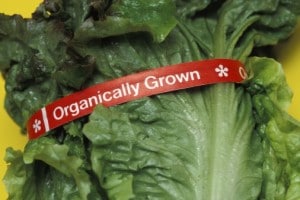 Fresh fruits and vegetables are more than just delicious. These colorful foods are packed with the vitamins, minerals, and water our bodies need to make us look, feel, and function at our best. Health professionals have traditionally recommended eating about 2-4 servings of fruit and 7-13 servings of vegetables each day, however, that recommendation has nearly doubled in recent years. As Celiac disease and gluten sensitivity make it more difficult for an estimated 1 in 133 Americans to eat certain wheat-based foods, a growing number of individuals are compensating by eating more fruits and vegetables. Unfortunately, the use of insecticides and other genetically modified organisms (GMOs) can pose a serious threat to long term health.
Fresh fruits and vegetables are more than just delicious. These colorful foods are packed with the vitamins, minerals, and water our bodies need to make us look, feel, and function at our best. Health professionals have traditionally recommended eating about 2-4 servings of fruit and 7-13 servings of vegetables each day, however, that recommendation has nearly doubled in recent years. As Celiac disease and gluten sensitivity make it more difficult for an estimated 1 in 133 Americans to eat certain wheat-based foods, a growing number of individuals are compensating by eating more fruits and vegetables. Unfortunately, the use of insecticides and other genetically modified organisms (GMOs) can pose a serious threat to long term health.
Of course, it’s possible to minimize exposure to harmful pesticides and GMOs while still eating a healthy amount of fruits and vegetables each day. With the help of the nation’s leading health research and advocacy organization, Environmental Working Group (EWG), we can identify which fruits and vegetables are highest in pesticides, and which are lowest. For the Dirty Dozen™ that are highest in pesticides, EWG reports that consumers may reduce pesticide exposure by nearly 80% simple by purchasing organic alternatives (i).
EWG’s Dirty Dozen™: Fruits and Vegetables That are Highest in Pesticides
According to the EWG, the following 12 food items are highest in pesticides when grown by conventional means (ii):
- Celery
- Peaches
- Strawberries
- Apples
- Blueberries
- Nectarines
- Bell Peppers
- Spinach
- Cherries
- Kale / Collard Greens
- Potatoes
- Grapes (Imported)
To reduce exposure to potentially toxic levels of pesticides, consumers should purchase only organically grown versions of the items listed above.
The Clean 15™: Fruits and Vegetables That are Lowest in Pesticides
The following 15 food items are conventionally grown in ways that use minimal amounts of pesticides:
- Onions
- Avocados
- *Sweet Corn (must be organic)
- Pineapple
- Mangos
- Sweet Peas
- Asparagus
- Kiwi
- Cabbage
- Eggplant
- Cantaloupe
- Watermelon
- Grapefruit
- Sweet Potato
- Honeydew Melon
*Important Note: When purchasing corn products, consumers should be aware that studies have linked certain types of corn with cancer. This is primarily due to the use of genetically modified organisms (GMOs) that conventional farmers and organizations, like Monsanto, use to grow corn. For this reason, we do not recommend purchasing or consuming any corn products unless they are grown organically.
Although the above food items are lowest in pesticides, consumers may still wish to consider buying organically grown versions to further reduce pesticide and GMO exposure.
Why Should I Care About Pesticides in My Produce?
Many consumers may wonder why it’s important to care about the pesticides and GMOs in food. After all, the FDA has cleared such chemicals for agricultural use. Moreover, many American farmers are proponents of pesticides and GMOs because they make it easier and more profitable to grow large amounts of produce.
Nevertheless, individuals who consume items listed under the EWG’s Dirty Dozen™ are exposed to an average of 10 different pesticides each day (iii). Those who consume organic fruits and vegetables, as well as those listed under the Clean 15™, are exposed to only 2 pesticides or less. Since eating “Clean” and “organic” produce can reduce exposure to pesticides by nearly 80%, the next logical question to ask is how bad are pesticides?
A Hazard to Health. Dr. Andrew Weil, holistic health professional and founder of the Arizona Center for Integrative Medicine (University of Arizona), has made the following statement on the hazardous nature of food pesticides:
“Pesticides are a toxin[…] A lot of these chemicals are toxic to the nervous system, and others may disrupt the endocrine functions of the body. They may increase the risk of cancer and other chronic diseases, so I think we should all be trying to take action to minimize our exposure to pesticides,” (iv).
Dr. Weil is not the only health professional who is concerned. In 2012, the American Academy of Pediatrics (AAP) recommended that action be taken to reduce pesticide exposure in children, stating children are “uniquely vulnerable to their toxicity,” (v).
A Holistic Perspective on Nutrition, Dentistry, and Wellness
At Assure A Smile, we take a holistic approach to dentistry that focuses on empowering patients to make lifestyle choices that will have a profoundly positive impact on not just oral health, but on mental, emotional, and physical health as well.
We believe patients and their smiles will enjoy a much healthier lifestyle through proper nutrition, diet, and care. As a holistic dentistry practice, we offer minimally invasive procedures that use biocompatible materials and reduce patients’ exposure to toxins. To experience holistic dentistry firsthand, readers are invited to contact our friendly front desk at 305.274.0047 or schedule an appointment online.
Sources:
(i) “EWG Shopper’s Guide.” Environmental Working Group. Accessed 8 April 2013. Click here to download the PDF.
(ii) See above.
(iii) See above.
(iv) “Dr. Weil on EWG’s Shopper’s Guide to Pesticides.” Youtube.com. Accessed 8 April 2013. Click here to watch the video interview.
(v) “AAP Makes Recommendations to Reduce Children’s Exposure to Pesticides.” American Academy of Pediatrics. Accessed 8 April 2013.





